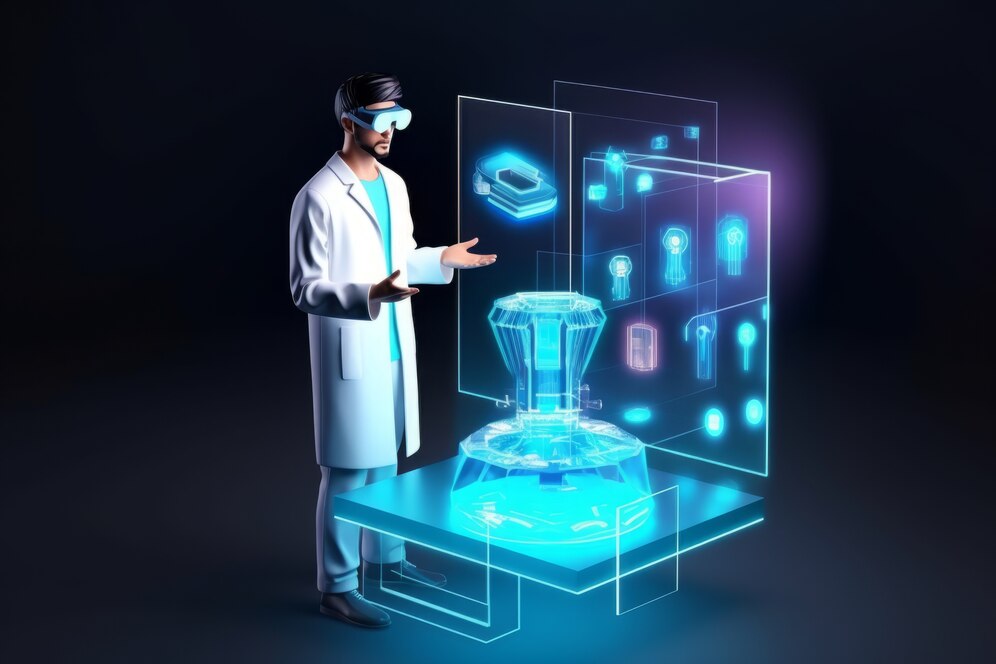Artificial Intelligence (AI) is revolutionizing various industries, and healthcare is no exception. By leveraging AI, healthcare providers can offer more accurate diagnoses, personalized treatments, and overall better patient care. The integration of AI into healthcare systems holds immense potential to transform medicine, making it more efficient and effective.
Understanding AI in Healthcare
AI, or artificial intelligence, refers to the simulation of human intelligence in machines. These systems are designed to think, learn, and adapt, making them valuable in fields requiring complex decision-making and data analysis. In healthcare, AI technological innovations include machine learning, natural language processing, and robotics, each contributing uniquely to medical advancements.
History and Evolution of AI in Medicine
AI in healthcare isn’t a novel concept. Its roots trace back to the early 1970s with the development of systems like MYCIN, designed to identify bacterial infections. Fast forward to today, AI has made significant strides, evolving to include sophisticated algorithms that analyze vast amounts of medical data to predict outcomes and suggest treatments.
Applications of AI in Healthcare
The applications of AI in healthcare are diverse, impacting various facets of medicine:
- Diagnostic Imaging: AI enhances the accuracy of interpreting imaging results, such as X-rays and MRIs, significantly reducing human error.
- Personalized Treatment Plans: AI helps tailor treatments to individual patients, considering their unique genetic makeup and medical history.
- Drug Discovery: AI accelerates the process of drug discovery, cutting down research time and costs.
- Robotic Surgery: AI-powered robots assist surgeons in performing precise and minimally invasive surgeries.
- Virtual Health Assistants: These AI systems engage with patients, providing them with timely reminders, health tips, and management strategies for chronic conditions.
AI in Diagnostic Imaging
Diagnostic imaging is one of the most impactful areas where AI is making a difference. Traditional imaging relies heavily on the expertise of radiologists, which can be prone to errors. AI systems, trained on thousands of images, can detect abnormalities with high precision, leading to early and accurate diagnoses.
Personalized Treatment Plans
AI plays a crucial role in precision medicine by analyzing genetic data and patient history to devise personalized treatment plans. This approach ensures that patients receive treatments best suited to their conditions, improving outcomes and reducing the trial-and-error process commonly associated with standard treatments.
AI in Drug Discovery
The traditional drug discovery process is time-consuming and expensive. AI can analyze large datasets to identify potential drug candidates quickly and efficiently. This not only speeds up the research process but also reduces costs, bringing new medications to market faster.
Robotic Surgery and AI
Robotic surgery is another groundbreaking application of AI in healthcare. AI-powered robots assist surgeons in performing complex procedures with increased precision and control. These systems minimize invasive techniques, leading to quicker recovery times and fewer complications for patients.
Virtual Health Assistants
Virtual health assistants, powered by AI, are transforming patient engagement. These systems provide patients with personalized health advice, medication reminders, and continuous monitoring of chronic conditions. By offering 24/7 support, virtual assistants improve patient adherence to treatment plans and overall health management.
Benefits of AI in Healthcare
The benefits of AI in healthcare are manifold:
- Improved Patient Outcomes: AI enhances diagnostic accuracy and treatment personalization, leading to better patient outcomes.
- Efficiency and Cost Reduction: Automation of routine tasks and accelerated research processes reduce operational costs and improve efficiency.
- Enhanced Research and Development: AI aids in processing vast amounts of data quickly, fostering innovation and development in medical research.
Challenges and Limitations
Despite its potential, AI in healthcare faces several challenges:
- Data Privacy Concerns: The use of patient data for AI training raises significant privacy issues.
- Ethical Considerations: The ethical implications of AI decisions in healthcare need careful examination.
- Integration with Existing Systems: Incorporating AI into existing healthcare systems requires substantial investment and infrastructure changes.
Future Prospects of AI in Healthcare
The future of AI in healthcare is promising, with several emerging trends:
- Advanced Predictive Analytics: AI will enable more accurate predictive analytics, helping in early disease detection and prevention.
- Telemedicine Integration: AI will enhance telemedicine services, making remote consultations more effective.
- AI-Powered Genomics: AI will drive advancements in genomics, offering deeper insights into genetic disorders and treatments.
Case Studies
Several case studies highlight the success of AI in healthcare:
- IBM Watson in Oncology: IBM Watson’s AI assists oncologists in devising personalized cancer treatment plans, improving patient outcomes.
- Google DeepMind and Diabetic Retinopathy: Google DeepMind’s AI system accurately detects diabetic retinopathy in patients, preventing vision loss through early intervention.
Regulation and Governance
Effective regulation is crucial for the safe implementation of AI in healthcare. Current regulations focus on ensuring data privacy and system reliability. However, as AI continues to evolve, future regulatory frameworks will need to address ethical considerations and standardize AI integration in healthcare systems.
Conclusion
AI is undeniably transforming the healthcare industry. From improving diagnostic accuracy to personalizing treatments, AI’s impact is profound and far-reaching. As technology continues to advance, the integration of AI in healthcare promises to revolutionize patient care, making it more efficient, personalized, and effective. The future holds immense potential for AI-driven healthcare innovations, paving the way for a healthier and more connected world.
